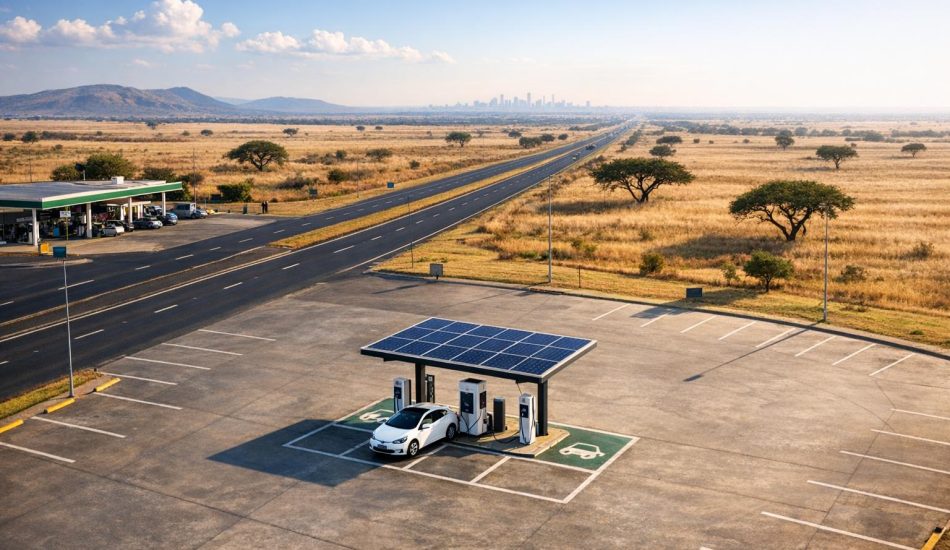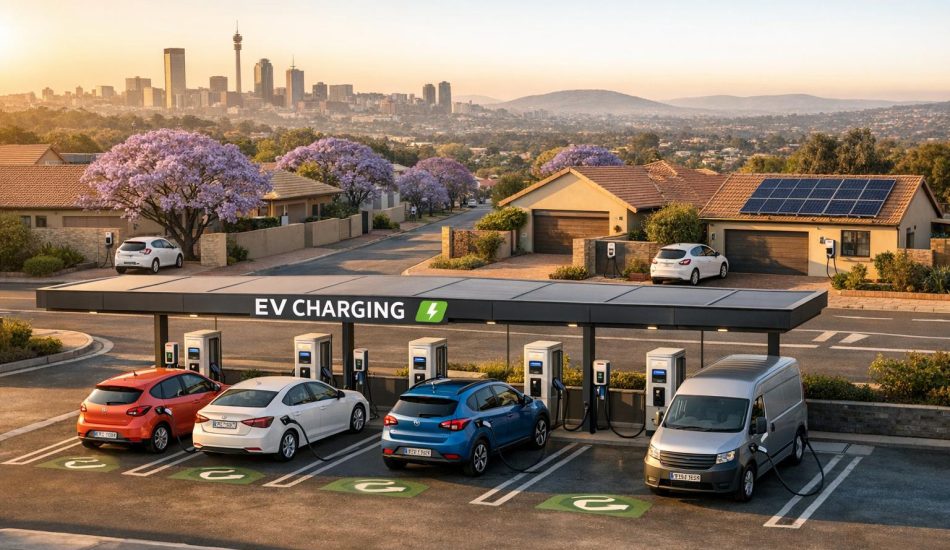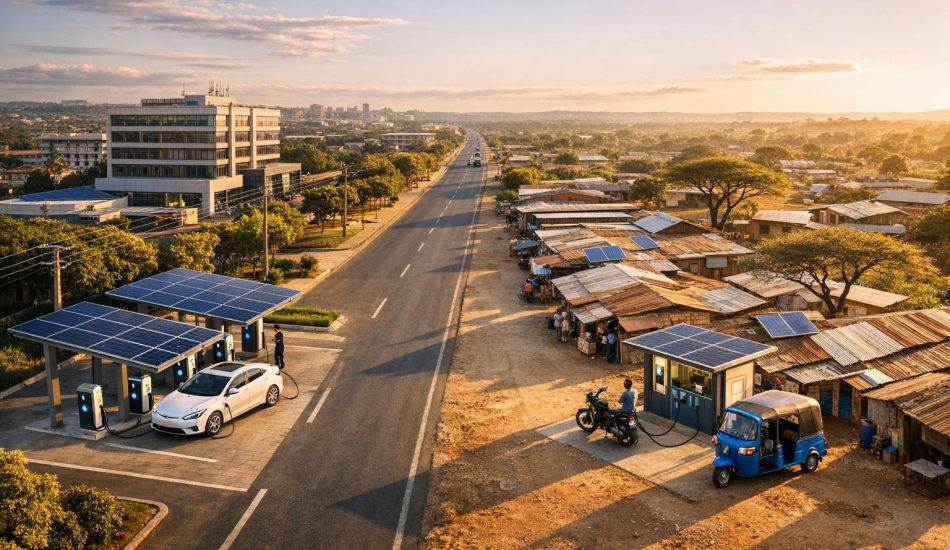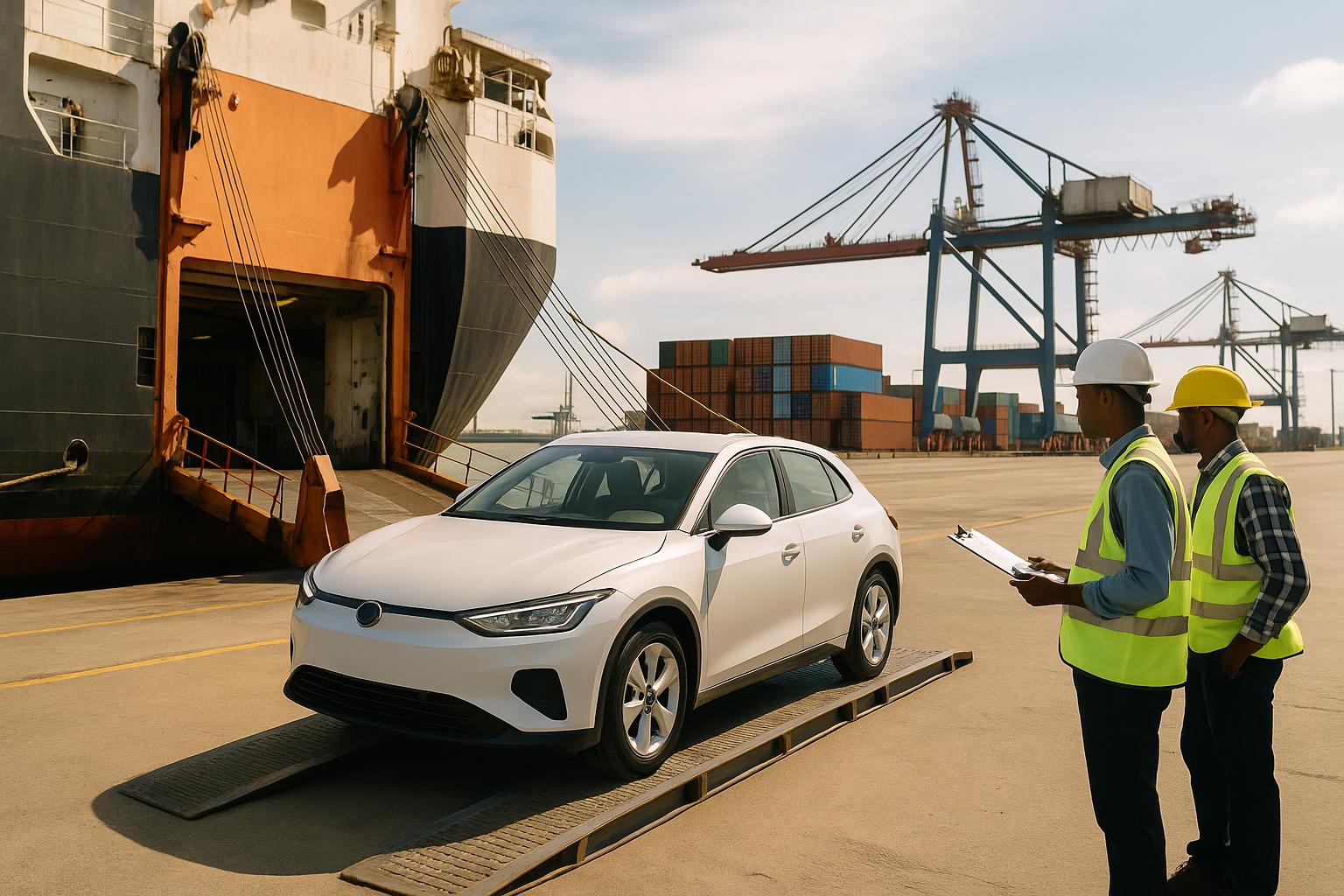
Importing electric vehicles (EVs) to Ghana in 2025 has become simpler and more cost-effective, thanks to new government policies. Ghana offers an eight-year import duty waiver for EVs, cutting costs significantly. However, you’ll still need to account for shipping, inspections, VAT, and other fees. Here’s what you need to know:
- Duty Waiver: Public transport EVs and registered assembly imports benefit from an eight-year waiver, saving 10–20% on duties.
- 10-Year Age Limit: Only vehicles manufactured in 2015 or later are allowed.
- Mandatory Inspections: Pre-shipment G-CAP inspections cost $200–$400 and are required for customs clearance.
- Shipping Costs: Shipping from the U.S. to Ghana starts at $1,650 for standard vehicles.
- Additional Fees: Taxes like VAT (12.5%), NHIL (2.5%), and port handling fees still apply.
Platforms like EV24.africa simplify the process by offering verified EV listings, guidance, and compliance support. Whether you’re importing a single EV or a fleet, understanding regulations, costs, and timelines is key to avoiding delays and unexpected expenses.
3 HIGH TECH CHINESE SUVs YOU CAN IMPORT TO GHANA UNDER GHS300,000
Ghana’s 2025 EV Import Rules
Ghana has introduced detailed policies for importing electric vehicles (EVs), giving importers a clear framework to follow. These rules outline specific opportunities and requirements, setting the stage for the processes and costs discussed in the sections below.
National Electric Vehicle Policy
The Ministry of Transport in Ghana unveiled the National Electric Vehicle Policy as part of the National Energy Transition Framework. This policy aims to boost EV adoption in public transportation, encourage local assembly, enhance maintenance training, and develop the necessary infrastructure to support EVs.
From 2024, EVs used in public transport benefit from an eight-year import duty waiver. Additionally, registered EV assembly companies enjoy an eight-year exemption on SKD (semi-knocked down) and CKD (completely knocked down) imports. Locally assembled EVs also qualify for VAT exemptions, significantly lowering production costs.
However, the policy’s stance on fully built private EVs remains unclear. The framework also stresses the importance of ensuring that the transition to EVs benefits communities across the country in a fair and balanced way.
G-CAP Requirements for EV Imports
Ghana’s EV import policies require compliance with the Ghana Conformity Assessment Program (G-CAP). This program mandates a pre-shipment inspection for all vehicles, including EVs, before they leave the United States for Ghana. Agencies like Bureau Veritas, SGS, and Intertek conduct inspections to ensure vehicles meet roadworthiness, safety, and compliance standards.
The G-CAP certificate, which serves as both a U.S. export document and a required import document for Ghana, is essential for customs clearance. However, this certificate is valid for only 90 days, making it crucial to synchronize inspection, shipping, and arrival schedules. Importers are advised to begin the G-CAP process 6–8 weeks before their planned shipment date. Inspection fees typically range between $200 and $400, forming a necessary part of the overall import budget.
Rules for New, Used, and Hybrid EVs
Ghana’s EV import regulations vary depending on the type of vehicle. New EVs generally face minimal restrictions, particularly when intended for public transportation, where duty exemptions apply.
For used EVs, Ghana’s general automotive rules come into play. These include a ban on vehicles older than ten years and a requirement to meet at least the Euro II emission standard. However, the tax policies for second-hand EV imports are not yet clearly defined.
Hybrid vehicles currently fall into a regulatory gray area, as the policy does not specify tax rates or treatment for new or used hybrids. Furthermore, duty exemptions do not extend to import service fees, port charges, inspection costs, or VAT.
Navigating these regulatory details is crucial, especially for private EVs and hybrids. Staying updated on policy changes is essential to avoid potential risks. Additionally, addressing infrastructure challenges, such as developing local service networks and ensuring sufficient charging facilities, is critical, as many areas in Ghana still lack adequate technical support.
Import Costs and Fees Breakdown
Understanding the full scope of import costs is essential for proper budgeting and avoiding unexpected expenses. Even when public transport EVs qualify for duty exemptions, importers still face several mandatory fees and taxes. Below is a detailed breakdown of these costs, followed by a practical example to illustrate how they add up.
Detailed Cost Breakdown
The total cost of importing a vehicle goes well beyond its purchase price. Importers must account for a variety of fees and taxes, which can significantly increase the final cost – even when some duties are waived.
- Vehicle Purchase Price: This is the starting point and includes the manufacturer’s cost or dealer price in the United States, along with domestic transportation to the port.
- Shipping and Logistics Costs: These vary depending on the port, shipping method, and time of year. While container shipping provides better protection, it is more expensive than roll-on/roll-off shipping.
- G-CAP Inspection and Preparation: A fixed fee of $400 per vehicle ensures compliance with pre-shipment standards.
- Import Duties: The duty rate depends on the EV’s classification and intended use. Public transport EVs enjoy an eight-year waiver on duties, while private EVs are subject to standard automotive import duties based on engine size and vehicle age.
- Value Added Tax (VAT): This is calculated at 12.5% of the duty-inclusive value. The VAT is applied to the total of the vehicle’s cost, shipping fees, and applicable duties.
- Additional Levies: These include a 2.5% NHIL (National Health Insurance Levy) and a 2.5% GETFund levy, both calculated on the same duty-inclusive value used for VAT.
- Port Handling and Clearance Fees: These cover customs processing, port storage, and vehicle release charges at Tema Port. Costs vary depending on processing time and any delays in documentation.
Sample Cost Calculation
To better understand how these fees add up, consider the example of a 2018 Toyota Corolla imported to Ghana. The total landed cost at Tema Port came to approximately $18,160, as outlined below:
| Cost Category | Amount (USD) |
|---|---|
| Vehicle Purchase Price | $14,000 |
| Shipping to Ghana | $1,800 |
| G-CAP Inspection & Prep | $400 |
| Import Duty | $800 |
| VAT (12.5%) | $650 |
| NHIL (2.5%) | $130 |
| GETFund Levy (2.5%) | $130 |
| Port Handling Fees | $250 |
| Total Landed Cost | $18,160 |
In this example, additional fees and taxes added over $4,000 to the base cost of the vehicle and shipping. For EVs eligible for duty exemptions, the total cost would be lower, reflecting the waived duties.
Currency and Formatting Notes
All costs in this guide are presented in U.S. dollars, following standard American formatting conventions. Commas are used as thousand separators (e.g., $18,160), and periods denote decimal points (e.g., $1,250.50). Keep in mind that exchange rate fluctuations between the U.S. dollar and the Ghanaian cedi can impact local payment amounts, so it’s wise to factor in potential currency conversion costs when planning your budget.
Step-by-Step EV Import Process
Bringing an electric vehicle (EV) into Ghana involves three main stages: selecting the right EV, preparing it for shipment, and completing customs clearance. Each step demands careful attention to paperwork and timing.
Finding EVs on EV24.africa
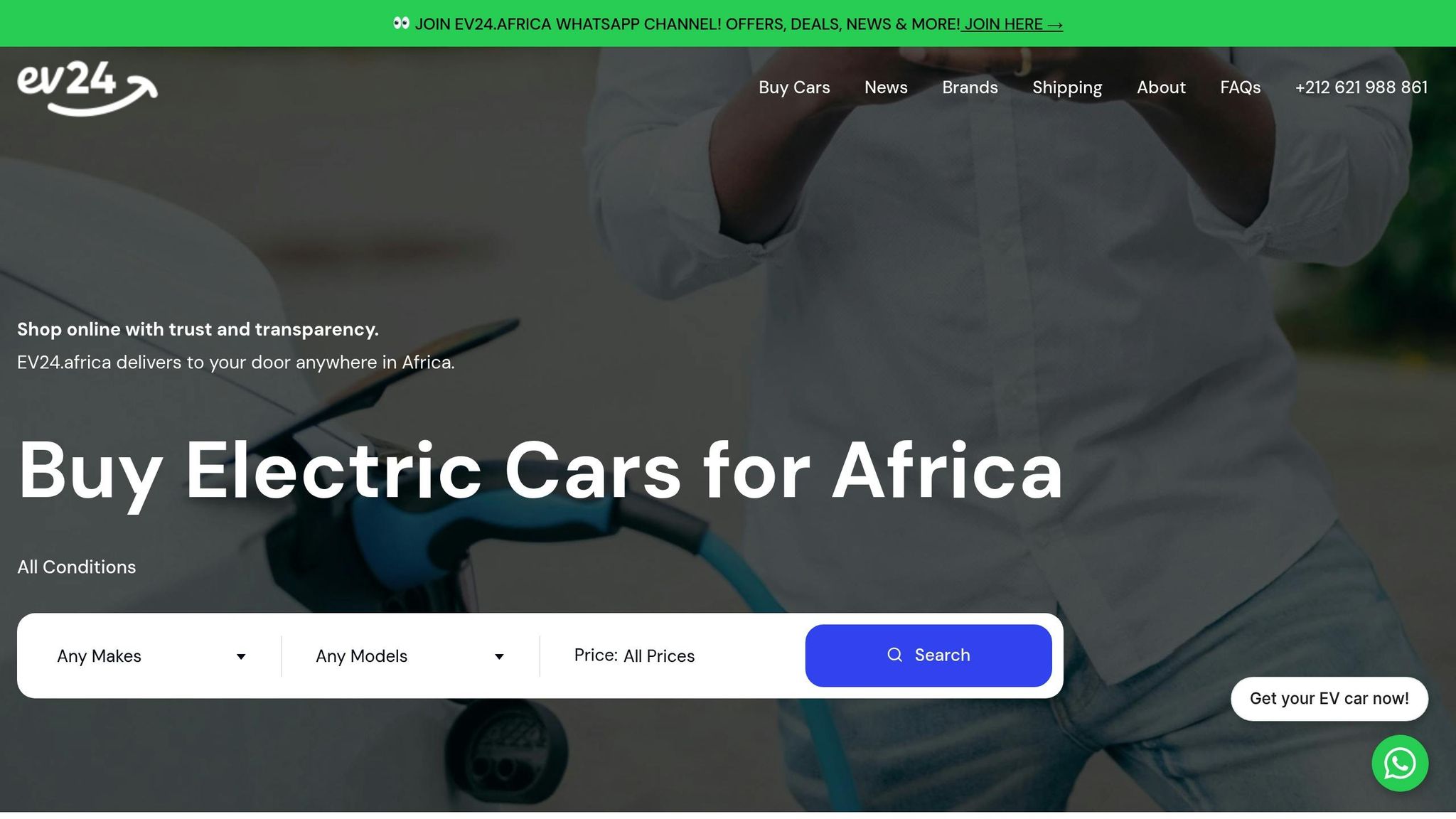
EV24.africa is a dedicated marketplace for electric vehicles tailored to African markets. It provides clear pricing and detailed specs for popular brands like Tesla, BYD, Volkswagen, XPeng, Leapmotor, Changan, Wuling, Mercedes-Benz, Citroën, and Peugeot. Prices range widely, from budget-friendly models such as the GEELY PANDA MINI BASE at $5,880 to high-end options like the ZEEKR 009 priced at $85,000.
The site’s search filters make it easy to refine your options by brand, model, and production year. Keep in mind that Ghana enforces a strict 10-year age limit on imported vehicles, meaning only cars manufactured in 2015 or later can be brought into the country for 2025. Each listing includes details like range (in kilometers), battery specs, transmission type, and straightforward pricing – no hidden fees.
The "View Details" feature on EV24.africa provides in-depth specs for each vehicle, enabling you to assess critical factors like battery range and charging capabilities. Be sure to check the drive configuration, as Ghana does not allow right-hand drive vehicles – only left-hand drive models are permitted.
If upfront costs are a concern, EV24.africa also offers financing options. This can help you balance your budget while preparing for additional costs like shipping and import fees. With the vehicle selected, you’ll need to gather the necessary documents to proceed to the next stage.
Pre-Shipment Setup
The pre-shipment process involves inspections, paperwork, and logistics. A key requirement is the G-CAP (Ghana Conformity Assessment Program) inspection, which ensures the vehicle meets roadworthiness, safety, and emissions standards. This inspection, conducted by approved agencies like Bureau Veritas, SGS, or Intertek, costs $400. It’s essential to schedule this inspection after confirming your purchase but before making shipping arrangements, as G-CAP certificates are only valid for 90 days.
You’ll also need to prepare key documents, including the original vehicle title, commercial invoice, and Automated Export System (AES) filing. These must be submitted at least 72 hours before the vehicle departs. Additionally, secure an Import Declaration Form (IDF) via Ghana’s ICUMS system and ensure you have a valid Taxpayer Identification Number (TIN).
When it comes to shipping, EV24.africa offers "hassle-free shipping & delivery" services with two primary options: RoRo (Roll-on/Roll-off) and container shipping. RoRo is more cost-effective, while container shipping provides added protection for high-value vehicles. For example, shipping a standard sedan from New York to Tema Port costs about $1,650, though prices can vary depending on the departure port and vehicle size. Door-to-door delivery options are also available, simplifying the process for first-time importers.
Choose a shipping company experienced in Ghana’s vehicle export requirements. They should coordinate with G-CAP inspection agencies and provide shipment tracking. Transit times from major U.S. ports to Tema typically range between 3 to 5 weeks, depending on the route and any stops along the way.
Once shipping is arranged, the focus shifts to clearing customs upon the vehicle’s arrival.
Customs Clearance and Registration
When your EV arrives at Tema Port, the customs clearance process begins. Using the Integrated Customs Management System (ICUMS), you’ll submit all required documents. Well-prepared imports generally clear customs within 4–8 days: document review takes 1-2 days, physical inspections 1-3 days, duty assessment and payment 1-2 days, and final release authorization about 1 day.
EV24.africa offers a "Full Support & Compliance" service to streamline customs clearance. This service handles paperwork and works with experienced clearing agents to address potential issues like valuation disputes or missing documents, which could otherwise delay the process.
One major advantage of importing an EV is Ghana’s eight-year import duty waiver for electric vehicles, introduced in 2024. This significantly lowers the overall cost compared to traditional vehicles. However, other charges like VAT, NHIL, and GETFund levies may still apply, depending on the vehicle’s use and current regulations.
After clearing customs, the final step is registering your EV with Ghana’s Driver and Vehicle Licensing Authority (DVLA). This involves a technical inspection to confirm the vehicle’s roadworthiness, submission of all import and customs documents, payment of registration fees, and title processing. Once all documents are in order, the DVLA registration process typically takes 2-5 days.
The technical inspection ensures your EV meets Ghana’s safety standards. Once approved, the DVLA will issue license plates and registration documents, officially authorizing your EV for use on Ghanaian roads. Be sure to keep all import, customs, and registration documents on hand – they may be needed for future services, insurance claims, or if you decide to sell the vehicle.
sbb-itb-99e19e3
Tips for Smooth EV Imports
Bringing an electric vehicle (EV) into Ghana can be a seamless process if you plan carefully and pay attention to the details. Here are some practical tips to help you save money, avoid delays, and ensure everything goes smoothly.
Ways to Save Money
Take advantage of Ghana’s eight-year duty waiver for eligible public transport EVs and registered assembly imports. This can save you as much as 17.5% on standard duties and levies.
Consider consolidating shipments to cut down on shipping costs. For instance, using direct container routes can reduce expenses by up to 20%. Instead of shipping a single vehicle, coordinate with other importers or partner with EV24.africa to group multiple EVs into one container. This approach is especially beneficial for dealerships or fleet operators.
Timing your shipment can also make a big difference. Avoid peak shipping seasons, like the fourth quarter, when holiday demand drives up freight rates. Opt for direct container shipping to Tema Port, which often offers better rates compared to routes with multiple stops.
Lastly, work with experienced customs brokers to avoid valuation disputes and penalties. Their expertise ensures compliance with Ghana’s import regulations, saving you both time and money.
Meeting All Requirements
Getting your paperwork right is key to avoiding delays. Start by confirming that your EV complies with Ghana’s 10-year age limit and left-hand drive requirements. Don’t forget to schedule your G-CAP inspection, keeping in mind its 90-day validity.
Prepare all necessary documents well ahead of time. These include the original vehicle title, commercial invoice, AES filing (submitted at least 72 hours before departure), the Import Declaration Form through Ghana’s ICUMS system, and a valid Taxpayer Identification Number (TIN). Incomplete or incorrect documentation is one of the most common reasons for customs delays.
If you’re importing an EV for public transportation, check with the Ministry of Transport or Ghana Revenue Authority to confirm eligibility for the duty waiver. You’ll need to provide proof of the vehicle’s intended use and compliance with the National Electric Vehicle Policy. Once compliance is secured, focus on post-import plans to ensure your EV runs smoothly for years to come.
After-Sales Support and Maintenance
Long-term ownership success starts with proper planning. Tap into EV24.africa’s network of certified service centers and spare parts suppliers. Check the availability of local charging infrastructure in cities like Accra and Kumasi, and explore options for home or fleet charging setups. Joining local EV associations can also provide valuable insights into maintenance and parts sourcing.
Before finalizing your EV purchase, confirm that compatible parts and trained technicians are available in Ghana. EV24.africa’s "View Details" feature includes details about parts availability and service networks for each vehicle, helping you make informed decisions about ownership costs and maintenance.
Challenges and Opportunities in Ghana’s EV Market
Ghana’s electric vehicle (EV) market is still in its early stages, grappling with specific hurdles while showing potential for growth. Let’s explore the key challenges and the promising opportunities shaping this evolving sector.
Infrastructure and Policy Challenges
One of the biggest roadblocks for EV adoption in Ghana is the lack of charging infrastructure. Public fast-charging stations are few and far between, making long-distance travel inconvenient and limiting the usability of EVs. On top of that, frequent power outages undermine consumer confidence in the reliability of the market. Support services like charging, repair, and maintenance facilities are also underdeveloped. Many EV brands struggle with spare parts shortages and a lack of skilled technicians to service their vehicles, creating additional barriers for both consumers and businesses.
Still, there are signs that the market is gradually moving in a positive direction, with efforts underway to address these issues.
Market Growth Opportunities
While challenges exist, the opportunities for growth are equally compelling. The government’s introduction of the National Electric Vehicle Policy under the National Energy Transition Framework signals a clear commitment to driving EV adoption. Plans to expand charging networks, develop repair and maintenance services, and even support local component manufacturing are steps in the right direction.
Additionally, the growing popularity of EVs, fueled by competitive pricing and accessible second-hand import options, is paving the way for wider adoption. For businesses, particularly importers, this evolving landscape presents a chance to establish a strong foothold early on. Those who act now can position themselves strategically as the market matures and infrastructure improves.
Conclusion
Bringing electric vehicles (EVs) into Ghana in 2025 revolves around navigating regulatory requirements, understanding the total landed costs, and ensuring a smooth import process.
Key regulations to keep in mind include Ghana’s 10-year age limit on vehicles, the requirement for left-hand drive models, and mandatory G-CAP inspections. Public transport and registered assembly EVs benefit from an eight-year duty exemption, but private importers may face duties ranging from 10% to 20%, depending on the vehicle’s engine size.
Proper cost planning is essential. For instance, importing an EV priced at $30,000 typically results in total landed costs between $35,000 and $38,000. These costs include shipping, inspections, port handling, and administrative fees. Even with duty exemptions, importers must account for additional taxes and fees. A clear understanding of these costs highlights the importance of services that simplify the entire process – from purchase to registration.
Platforms like EV24.africa make importing EVs more accessible by managing every step, from sourcing vehicles that meet Ghana’s requirements to handling customs clearance. This helps importers avoid unexpected expenses and complications.
With over 100,000 vehicles imported into Ghana annually and the government aiming for 35% EV adoption by 2035, the market presents substantial opportunities for early adopters. Success in this growing sector depends on working with trusted experts, thoroughly understanding costs, and staying updated on regulatory changes. By combining these elements, importers can position themselves to thrive in Ghana’s evolving EV landscape.
FAQs
What steps do I need to take to import an electric vehicle to Ghana in 2025, and how can I ensure it meets all regulations?
To bring an electric vehicle (EV) into Ghana in 2025, you’ll need to navigate a few key steps. Here’s a breakdown to guide you:
- Pre-Shipment Inspection: Before shipping the EV, have it inspected by an approved agency to ensure it meets roadworthiness, safety, and emissions standards.
- Prepare Essential Documents: Gather all necessary paperwork, including:
- Original bill of lading
- Attested invoice
- Packing list
- Import Declaration Form (IDF)
- Taxpayer Identification Number (TIN) or GhanaCard PIN
- Any additional permits required by Ghanaian authorities
- Customs Clearance: Work with the Ghana Revenue Authority (GRA) using the Integrated Customs Management System (ICUMS). Customs officials will inspect the EV and calculate the duties and taxes you need to pay.
- Vehicle Registration: Once customs clearance is complete, you’ll need to register the EV with the Driver and Vehicle Licensing Authority (DVLA). This step includes an inspection of the vehicle, verification of its specifications, and payment of registration fees.
Make sure the EV complies with Ghana’s import regulations, such as the 10-year age limit and the left-hand drive requirement. Careful preparation and attention to these details can help you avoid unnecessary delays or complications.
How does Ghana’s eight-year import duty waiver impact the cost of bringing in an electric vehicle?
Ghana’s decision to implement an eight-year import duty waiver for electric vehicles has made a noticeable impact on the cost of bringing EVs into the country. By removing these duties, buyers can significantly cut down on expenses, which helps make EVs more affordable and within reach for more people in the Ghanaian market.
That said, there are still other costs to consider. Shipping fees, value-added tax (VAT), and registration charges remain part of the equation. Taking the time to account for these additional expenses can give you a clearer picture of the total cost when planning to import your EV.
What challenges might I face with EV charging in Ghana, and how can I prepare when importing one?
One of the biggest hurdles in Ghana is the scarcity of public fast-charging stations, which can complicate long-distance travel or frequent EV use. This is something to keep in mind, especially if you plan to depend on public charging options.
To address this, you might want to install a home charging station for reliable and convenient access to power. It’s also a good idea to map out the locations of existing charging stations and plan your trips around them. Choosing an EV with a longer driving range can ease your reliance on public chargers as well. Staying up-to-date on Ghana’s growing EV infrastructure will make it easier to adjust as the network develops.


